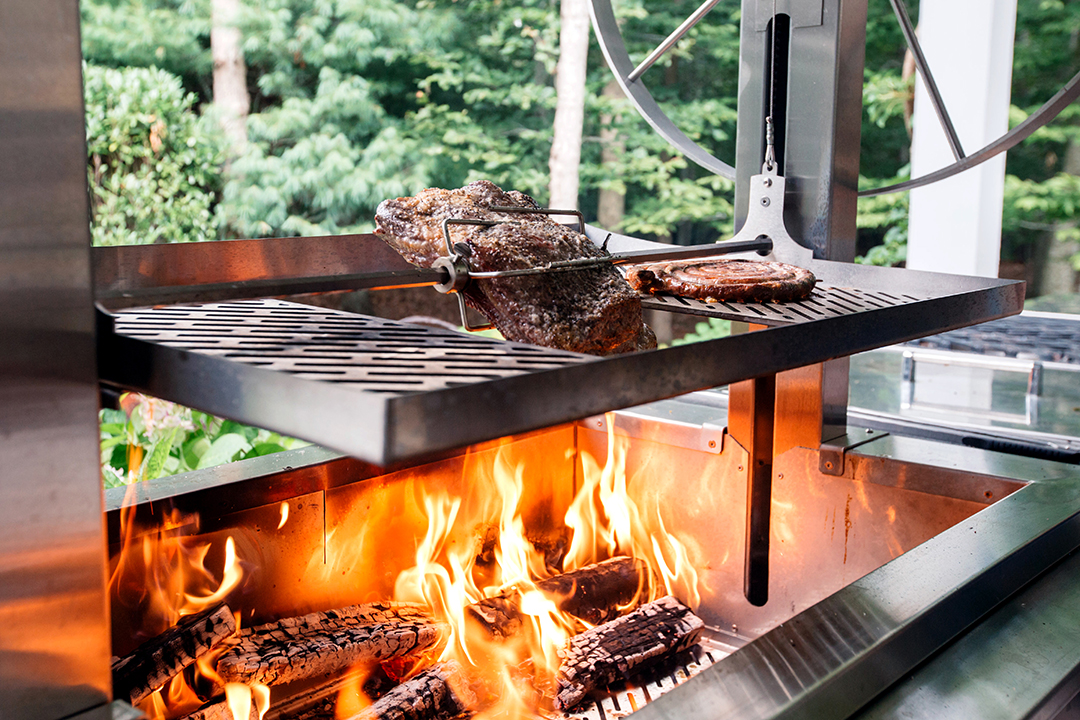
There is no disputing the convenience of a gas grill, but cooking with live fire – using either charcoal or wood – is an artisanal experience that enhances the flavour and is a gratifying way to spend some precious time outdoors. Kalamazoo grill master, chief product designer and cookbook author, Russ Faulk, is passionate about live fire cooking and has spent the last 17 years developing grills and smokers that embrace these methods. “The sound of the crackling fire, the radiant heat, the aromatic smoke and the incredible flavours all create an experience that is truly primal and immersive,” says Faulk.
When people think of live fire cooking, the image of an Argentine grill – a parilla or an asado-style barbecue – often comes to mind. This slow-roasting approach over an open wood fire has been perfected in Kalamazoo’s stainless steel Gaucho Grill – an Argentinian-style grill with a gas-powered starter that can easily ignite a wood fire in minutes. A ratchetless design for the 30-inch wheel allows it to turn smoothly while adjusting the height of the grilling and rotisserie rack above the fire. The fine control ensures that whatever meat is cooking will caramelise perfectly.

The key to success in live-fire cooking is learning to master the fire. An Argentinian-style grill like the Gaucho, Faulk points out, enables users to control the cooking temperature without changing the fire, simply by raising or lowering the food. For most live fire cooking sessions, Faulk has a more universal suggestion to control the temperature. “Whether you’re cooking with wood, charcoal or both, build a multi-zone fire in your grill. Having a strong fire, next to a medium fire, next to a low fire creates three different temperature zones you can work with as you cook,” Faulk shares. “Moving and flipping the food over the different parts of the fire is the dance that makes live fire cooking so much more engaging.”
Faulk explains the use of extreme temperatures is an important part of his approach to live fire cooking. “You’ll often find me using a charcoal fire in the Kalamazoo Hybrid Fire Grill to sear steaks at more than 1,000 degrees Fahrenheit,” he says. “It only takes 30 seconds per side to brown the meat, after which I move the steaks to an area of the grill where I’ve got no fire going whatsoever. I’ll close the lid and let those steaks cook at a slower pace as they coast up to medium-rare.”
Lower temperatures allow more time for a wood fire to impart the flavour of smoke. “Traditional American barbecue develops the deepest smoke flavour because the food spends hours cooking,” says Faulk. “Roasting and rotisserie is sort of a middle ground. A rack of beef plate ribs cooked on the rotisserie over an oak wood fire has become one of my absolute favourites. The flavour of oak in the finished product is distinctive without becoming overpowering.”

Another area for experimentation, Faulk recommends, is cooking directly in the coals. “One of my favourite appetisers to prepare when entertaining is shishito peppers cooked directly on the glowing embers from a wood fire. It adds a bit of theatrical flavour to the equation.” He also recommends cooking lobster tails this way, saying “the way the shell chars in the coals infuses the meat with a flavour everyone should experience at least once.”
For those who are beginners at this culinary craft, Faulk offers some words of wisdom: “You learn live fire cooking by touch and feel,” he explains. “Be patient, experiment often and always err on the side of more moderate heat – because no one likes dry, overcooked meat or fish.” For Kalamazoo grill owners who aspire to enhance their culinary skills, Faulk hosts regular virtual Q&A and cooking sessions where he shares his favourite recipes, live fire grilling techniques and tips to master their equipment. An on-demand video resource centre is also available to home cooks looking to hone various skills.
Explore Kalamazoo’s world-class barbecues and embark on your live fire culinary journey.







